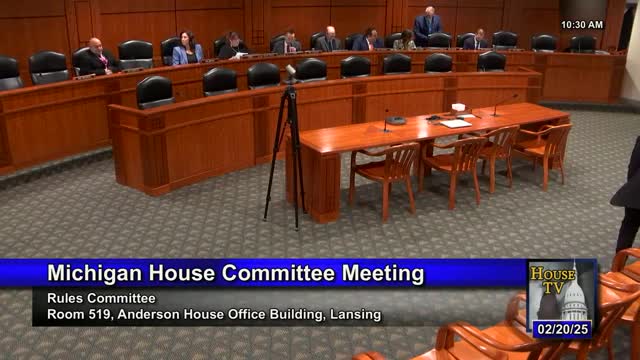House Rules Committee adopts committee rule, sets regular meeting time and hears briefing on Michigan rulemaking process
Get AI-powered insights, summaries, and transcripts
Subscribe
Summary
The Michigan House Rules Committee unanimously adopted an internal committee rule and established Room 519, Anderson House Office Building, Thursdays at 10:30 a.m. as its regular meeting time and heard a presentation from the Michigan Office of Administrative Hearings and Rules outlining the state's administrative rulemaking procedures.
The Michigan House Rules Committee adopted an internal committee rule and set Room 519 in the Anderson House Office Building as its regular meeting location and time, then heard a briefing on the state administrative rulemaking process from staff of the Michigan Office of Administrative Hearings and Rules.
Representative Aragona moved to adopt the proposed committee rule; the clerk recorded 7 yeas, no nays and no passes and the motion prevailed. Representative Martin then moved to designate Room 519 on Thursdays at 10:30 a.m. as the committee's normal meeting day, time and location; the clerk again recorded 7 yeas, no nays and no passes and the motion prevailed. Representative Wenzel moved to excuse absent members later in the meeting; that motion carried by unanimous consent and the committee adjourned.
The committee then received a presentation from Paige Fultz, director of policy and legislative affairs at the Michigan Department of Licensing and Regulatory Affairs, and from Suzanne Sonneborn, executive director of the Michigan Office of Administrative Hearings and Rules (MOAHR), with Katie Wenceski, director of MOAHR's administrative rules division, also speaking. Fultz described MOAHR as “a type 1 agency within the Department of Licensing and Regulatory Affairs” and said it operates independently from LARA in overseeing administrative hearings and rulemaking.
Sonneborn summarized the steps now required under the Administrative Procedures Act (APA) for state rulemaking and described five statutory paths agencies may use to promulgate rules: the standard (full) process, the shortened process (often used to amend or rescind obsolete rules or to conform rules to new statutes), the MIOSHA process for rules substantially similar to federal occupational-safety standards, the emergency-rule process, and the Environmental Rules Review Committee (ERRC) pathway as it existed prior to changes made by Public Act 9 of 2024. “The rulemaking process, as you may know, is governed by the Administrative Procedures Act,” Sonneborn said.
She outlined the standard sequence: an agency files a request for rulemaking (RFR); MOAHR reviews and approves drafts for legality and style and notifies the Joint Committee on Administrative Rules (JCAR); the agency produces a regulatory impact statement (RIS) and cost-benefit analysis (CBA); the agency publishes notice of public hearing (in three newspapers, including one in the Upper Peninsula, and in the Michigan Register) and holds a hearing accepting public comment; MOAHR assembles the final draft and related documents and sends them to JCAR, which has 15 session days to consider the rules before they may be filed with the Office of the Great Seal. Sonneborn noted agencies may request a waiver of the remaining JCAR days.
On MIOSHA rules, Representative Aragona asked why MIOSHA follows a separate process. Katie Wenceski answered that the APA itself provides the MIOSHA exception: if a MIOSHA rule is substantially similar to a federal Occupational Safety and Health standard, MIOSHA need not hold a public hearing or submit the rule to JCAR but must publish the proposed rule in the Michigan Register at least 35 days before filing and allow a comment period.
Sonneborn and Wenceski also described the emergency-rule path under section 48.1 of the APA, which allows agencies to promulgate rules immediately for up to six months if the governor concurs that immediate action is required for public health, safety or welfare; one six-month extension is available with a governor's certificate of need. If an agency wants a permanent rule after an emergency rule expires, it must follow the standard process.
Committee members asked for publication details and historical counts of rule activity. MOAHR staff said notices are published in newspapers of general circulation chosen to reach the broadest audience; they also emphasized that notices are posted on department websites. MOAHR provided 2024 counts: 75 rules added, 71 rescinded and 258 amended. Staff also provided historical annual figures for 2019–2023 on request.
Representative Martin commented on the change to the ERRC process, noting past testimony suggested only “reasonable, logical” rule proposals reached ERRC review; he said he intended to monitor rulemaking activity in natural resources now that the ERRC had been transferred. MOAHR staff confirmed the ERRC transfer and that pending EGLE rule sets had moved to the director of EGLE or designee following the transfer effective Sept. 17, 2024.
There were no formal policy votes beyond the committee housekeeping motions; the committee adjourned after excusing absent members.
The committee did not set deadlines for follow-up in the transcripted discussion; NO further actions were recorded in the meeting minutes included in the transcript.
